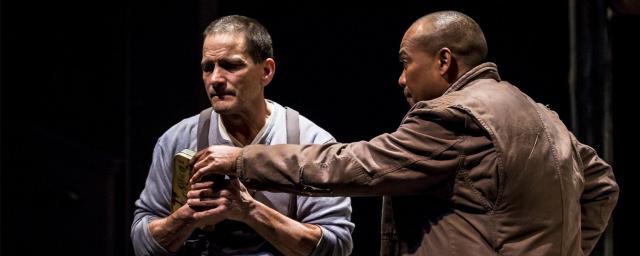
Family relationships can be a knotty business, if one considers the rivalries, tiffs, childhood pranks and taunts that can leave lasting scars even into adulthood. Add race into the mix and you have Blood Knot, Athol Fugard’s 2012 play about South African life under apartheid.
This two-hander consists of two brothers, born of the same mother but with different fathers. As a result, one of the grown brothers (Morris) is light enough to pass for white – which he does for a while before appearing on his brother’s doorstep. The other brother (Zach) has dark skin, which forces him to subsist on the meager wages he earns from his menial job as a gatekeeper. The play takes place near Port Elizabeth, South Africa.
Morris lives in the shadows. He cannot (or will not) risk the questioning looks and attention that others may give a light-skinned man in this non-white part of town. So he often chooses to go out late at night, even to do the necessary grocery shopping. While Zach is at his mundane job, Morris stays home to cook and clean for them both.
Upon Zach’s return each evening, Morris goes into a calculated routine whereby he first washes Zach’s aching feet, and then feeds him supper. Before bed, Morris recites some Bible verses to Zach. Morris is the only one who can read and write.
Adding some offstage drama to this play is the director’s choice to cast a white actor (Jim DeVita) as the light-skinned brother. Traditionally, this is the way it has been done. But in 2018, some in the acting community have expressed dissent over white actors appropriating parts that are meant for actors of another race. The fact that Athol Fugard himself played the “white” brother when the play first opened shouldn’t justify the current casting choices, some say. The play’s director is Ron OJ Parson; he stands by his decision to cast DeVita in the part. Without getting further embroiled in the controversy, this reviewer must state that Jim DeVita is one of Wisconsin’s finest actors. DeVita brings a “brooding intensity” to the role of Morris (a cliché, to be sure, but in this case, it describes his acting to a “T”). His character paces the stage, nervously, whenever Zach is away. The slightest noise outside the window gives him a jolt. He apologizes over and over to Zach (Gavin Lawrence) for things he said and did while posing as a white man. One cannot anticipate DeVita’s next move, which makes his such a fascinating actor to watch.
While we never learn the complete truth about Morris’s past, DeVita turns Morris into a compelling figure of wealth and privilege. This is more difficult to do, given the brothers’ sparse possessions.
In the early part of the play, Morris tucks away a small amount of Zach’s wages in hopes of saving enough to buy a farm. Zach, who lives in the here and now, isn’t as concerned about some future farm as he is on getting his hands on a woman. In other words, he has an immediate need that he wants to fulfill. To appease him, Morris wonders if Zach would be satisfied with a female pen pal.
One of the most humorous parts of the play is when Morris reads out loud some advertisements for pen pals in the local paper. Morris even offers to write the first letter for a reluctant Zach.
However, when a return letter arrives containing the photo of a white girl, Zach is suddenly very interested in this pen pal idea. He fancies himself as a suitable escort for this “white girl,” while Morris sees nothing but disaster ahead. During the apartheid years, as Morris reminds Zach, any such coupling could mean imprisonment for them both.
The play’s turning point is when the girl announces her intentions to come and visit. Zach has what he thinks is a “brilliant” idea: he wants his light-skinned brother to impersonate him. At first, Morris isn’t keen on the idea. He hopes to send the girl a note saying that they will be out of town during the time she is visiting. But Zach manages to wheedle the “farm money” out of Morris to purchase a formal white suit, hat, and all the trimmings. It is meant for Morris to wear when the girl arrives.
Jim DeVita rises to the occasion when Morris puts on the clothes and assumes his “white” personality. During this make-believe game, he is cruel and malevolent towards his brother. Horrified at his own actions, Morris takes off the suit and refuses to go along with Zach’s plan. Their lives continue to spiral downward until the end of the play.
That the play takes place in American Players Theater’s 200-seat indoor space makes it impossible for the audience to sit back and observe the action. The result is a searing, involving discourse on the nature of filial relationships. At least between these two brothers, their love/hate reactions are amplified by the division of race – a gap so wide that they fear it cannot be crossed.
